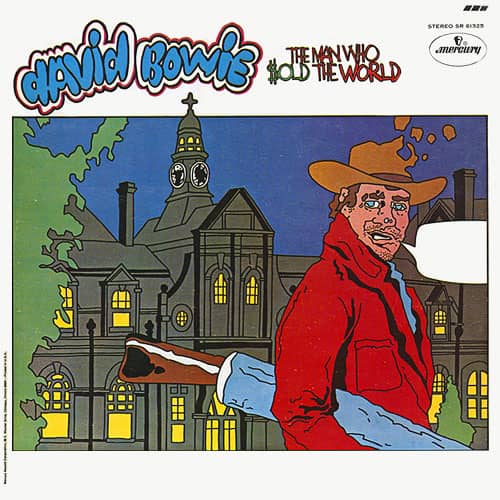David Bowie’s third album, The Man Who Sold The World, was released in the United States of America on 4 November 1970.
The album was issued five months before its UK release. It initially sported a cartoon cover drawn by Bowie’s friend Michael J Weller. The artist suggested a painting of Cane Hill Hospital, not knowing that Terry Burns was treated there.
In the foreground of the picture was a cowboy figure clutching a rifle – a reference to ‘Running Gun Blues’. His fragmenting hat further suggested the themes of madness which run through the album.
The album sold better in the US than in Bowie’s home country. Mercury’s publicity department gave it a bigger push, and the warm critical reception led to Bowie undertaking a three-week promotional tour of the USA in February 1971, his first visit there.
Later in 1971 he spoke to Penny Valentine from UK music weekly Disc and Music Echo, explaining why he thought the album had done well:
For one thing it got massive airplay, and I suppose in a way it’s more palatable than things I’ve done in the past because of its heavy backing.That’s all credit to Tony Visconti, who produced it, it was my idea initially to get heavier – just to try another way – but he got it all together. I probably needed a heavier sound behind me, and obviously it’s worked. It’s not that I have a very strong feeling for heavy music – I don’t. In fact, I think it’s fairly primitive as a music form.
I look for sensation rather than quality, and heavy music seems to be full of musicians who have quality rather than musicians who for some reason can chill your spine. I suppose really I look for something in music that I look for in my own life.
Disc and Music Echo
When the album was reissued in 1972, in the wake of Ziggy’s success, it reached number 24 in the UK and 105 on the US Billboard 200.
Also on this day...
- 1987: Live: Sydney Entertainment Center, Sydney
- 1983: Live: Entertainment Centre, Perth
- 1972: Live: Celebrity Theatre, Phoenix
- 1969: Travel: Zürich to London
- 1968: Filming: The Virgin Soldiers
Want more? Visit the David Bowie history section.

